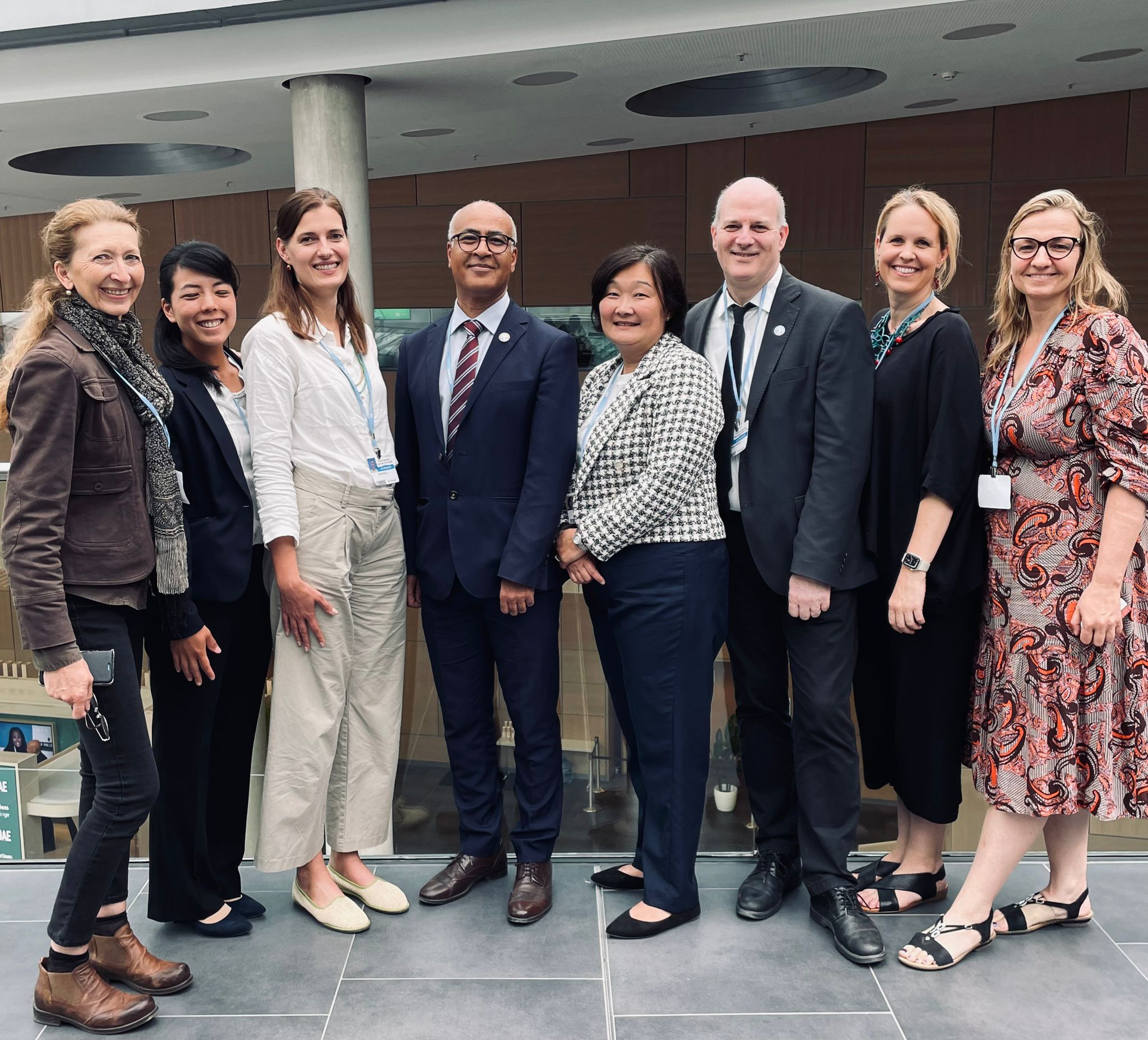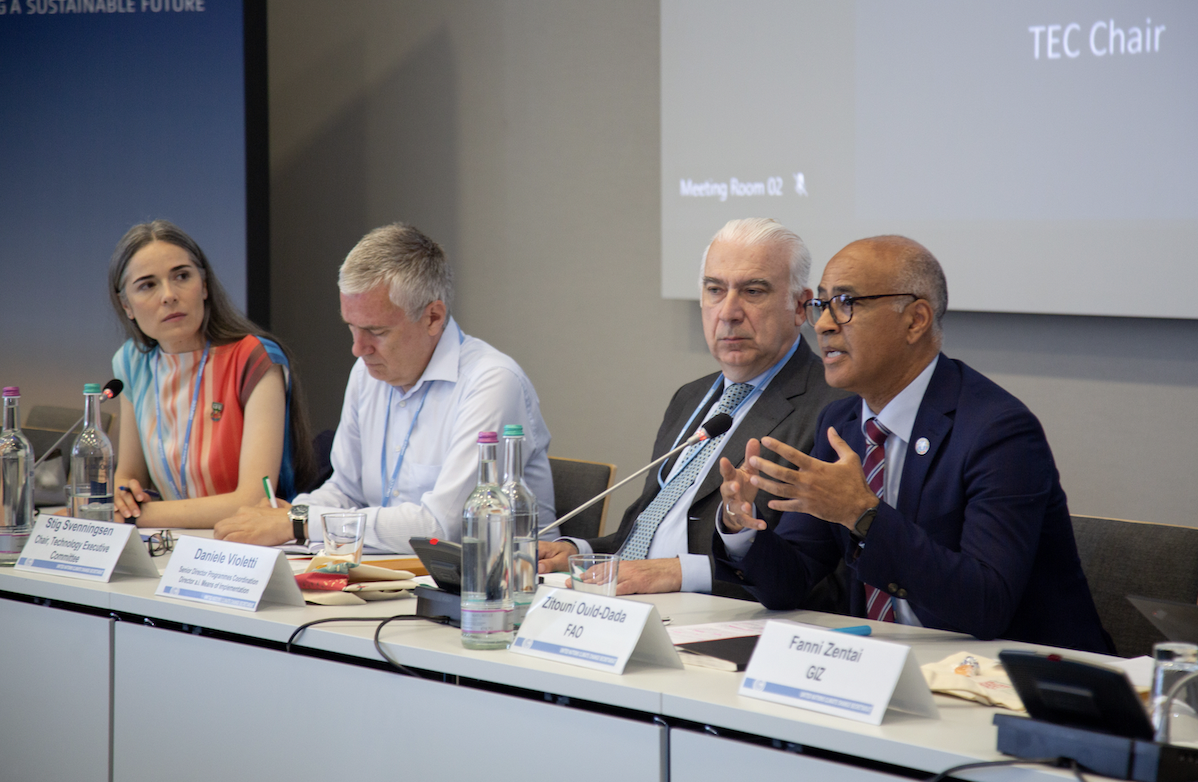Agriculture and food systems at the heart of climate solutions at UNFCCC Bonn Climate Conference

The food we eat and its journey from farm to plate are responsible for as much as one third of human-induced greenhouse gas emissions. Our food and the communities that produce it are also more at risk and vulnerable than ever before to the changing climate.
So it was no surprise that as thousands of participants, including representatives from over 200 countries arrived in Bonn for this year’s climate conference; the role of agriculture, forests and food systems was higher on the agenda than ever before.
Laying the groundwork for decisions at COP28, the two weeks of events and negotiations built on mandates and agreements that emerged from COP27, where FAO co-hosted the first ever Food and Agriculture Pavilion and agriculture and food systems really started to gain momentum.
The Bonn Conference was therefore a chance for the FAO delegation to build on that momentum highlighting that efficient, inclusive, resilient and sustainable agrifood systems are a fundamental part of climate solutions.
“We have been observing negotiations and running events to ensure that the climate action solutions offered in agriculture and food security are part of the conversation at high-level meetings”, said Senior Natural Resources Officer, Julia Wolf reporting from the conference.
Multi-faceted agrifood system solutions
Co-leading several events including the Technical Executive Committee (TEC)-FAO Thematic Dialogue on accelerating climate innovation and technology, and another on climate action in agriculture and the new four-year Sharm el-Sheikh joint work there was a strong emphasis on the fact that mitigation and adaptation are co-dependents.
“Mitigation, in the correct way, is needed and at scale, but mitigation without synergies, trade-offs and adaptation co-benefits will lead to hunger and food insecurity,” said Dr Aditi Mukherji, Director, Climate Change Adaptation and Mitigation Impact Action Platform of the CGIAR.
Climate finance is fundamental to catalyze action at scale and was a key topic of discussions, “concrete measures need to be discussed and agreed on to ensure that there is improved access to finance for the most vulnerable, and an increase in the 3 percent share of climate finance that is currently going to agriculture. The Food and Agriculture Sustainable Transformation Initiative (FAST) launched at COP27 plays a key role in mobilizing support,” said Senior Natural Resources Officer, Martial Bernoux.
The TEC-FAO Thematic Dialogue on accelerating climate innovation and technology brought together a panel of experts representing farmers, the UN, Local Communities and Indigenous Peoples, Ministries of Agriculture, geospatial monitoring and Youth. They presented good practices and ‘game-changing’ technological solutions throughout the different sessions but remarked that the lack of technology itself tends not to be the issue. The use of technology and implementation are only effective when all stakeholders participate, involve rural women in equal ownership and work in partnership.
FAO Natural Resources Officer, Reuben Sessa shared experiences during the ACE Dialogue related to FAO’s work enabling society to be a part of the climate solution through climate change education and public awareness, training, public participation and access to information and international cooperation. The Youth and United Nations Global Alliance (YUNGA) is an important example of this work.
Another event discussed the elements that are fundamental in feeding the world; energy, water and food systems, and the panelists concluded that all three are only resilient and sustainable in the face of climate change when tackled in unison.
Indigenous knowledge systems were presented as transformative solutions that should not only be protected but heralded as ways in which we can live in harmony with nature. FAO’s Globally Important Agricultural Heritage Systems programme is an example of such Indigenous Knowledge perfected through generations.
Bonn was also the moment to prepare for COP28 decisions to operationalize the new Loss and Damage Fund. FAO will support Member countries to pursue resources available through the new Loss and Damage fund and help them to access the technical assistance of the Santiago Network.
 .
. 
Getting ready for COP28
En route to COP28 in December, Regional Climate Weeks will provide dedicated platforms for discussing specific challenges and opportunities within different regions. With agriculture providing the livelihood to more than 50% of these regions’ population, agrifood systems are likely to be a big part of the conversation.
The Climate Weeks and the UN Food Systems Summit Stocktaking Moment in July, pave the way not only to COP28 but also to the Climate Ambition Summit in New York in September. Here the UN Secretary-General António Guterres is urging leaders from governments, business, cities and regions, civil society, and finance to come with new, tangible, and credible climate action to accelerate the pace of change.
“It’s been quite a journey but the COP28 Presidency has put food and agriculture at the center of this year’s climate conference through the Food and Agriculture System task force and the call for Action under the Marrakesh Partnership and the Sharm-El-Sheikh Adaptation Agenda which brings together a myriad of different actors,” said FAO Deputy Director Zitouni Ould-Dada.
“For FAO this is great news because the solutions to the climate and biodiversity crises lie in transforming agrifood systems to ensure better production, better nutrition, a better environment and a better life and livelihoods, leaving no one behind.”
At COP28 in the United Arab Emirates, FAO will again co-host the Food and Agriculture Pavilion.
Learn more:
Webpage: FAO at COP28
Website: FAO Climate Change
Publication: FAO Strategy on Climate Change
